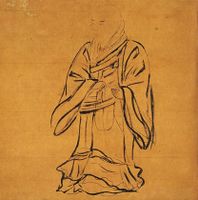Difference between revisions of "Shinran"
| Line 7: | Line 7: | ||
|MainNamePhon=Shinran | |MainNamePhon=Shinran | ||
|MainNameJapTranslit=Matsuwakamaro | |MainNameJapTranslit=Matsuwakamaro | ||
| + | |bio=Shinran (1173–1263) lived during the late-Heian early-Kamakura period (1185–1333), a time of turmoil for Japan when the emperor was stripped of political power by the shōguns. Shinran's family had a high rank at the Imperial court in Kyoto, but given the times, many aristocratic families were sending sons off to be Buddhist monks instead of having them participate in the Imperial government. When Shinran was nine (1181), he was sent by his uncle to Mount Hiei, where he was ordained as a śrāmaṇera in the Tendai sect. Over time, Shinran became disillusioned with how Buddhism was practiced, foreseeing a decline in the potency and practicality of the teachings espoused. | ||
| + | |||
| + | Shinran left his role as a dosō ("practice-hall monk") at Mount Hiei and undertook a 100-day retreat at Rokkaku-dō in Kyoto, where he had a dream on the 95th day. In this dream, Prince Shōtoku appeared to him, espousing a pathway to enlightenment through verse. Following the retreat, in 1201, Shinran left Mount Hiei to study under Hōnen for the next six years. Hōnen (1133–1212) another ex-Tendai monk, left the tradition in 1175 to found his own sect, the Jōdo-shū or "Pure Land School". From that time on, Shinran considered himself, even after exile, a devout disciple of Hōnen rather than a founder establishing his own, distinct Pure Land school. ([https://encyclopediaofbuddhism.org/wiki/Jodo_Shinshu Source Accessed October 16, 2019]) | ||
|YearBirth=1173 | |YearBirth=1173 | ||
|YearDeath=1262 | |YearDeath=1262 | ||
Latest revision as of 17:00, 16 October 2019
| English Phonetics | Shinran |
|---|---|
| Japanese Transliteration | Matsuwakamaro |
| Birth: | 1173 |
|---|---|
| Death: | 1262 |
Tibetan calendar dates
- Religious Affiliation
- Founder of Jōdo Shinshū, or "True Pure Land School"
- Teachers
- Hōnen
Biographical Information
Shinran (1173–1263) lived during the late-Heian early-Kamakura period (1185–1333), a time of turmoil for Japan when the emperor was stripped of political power by the shōguns. Shinran's family had a high rank at the Imperial court in Kyoto, but given the times, many aristocratic families were sending sons off to be Buddhist monks instead of having them participate in the Imperial government. When Shinran was nine (1181), he was sent by his uncle to Mount Hiei, where he was ordained as a śrāmaṇera in the Tendai sect. Over time, Shinran became disillusioned with how Buddhism was practiced, foreseeing a decline in the potency and practicality of the teachings espoused.
Shinran left his role as a dosō ("practice-hall monk") at Mount Hiei and undertook a 100-day retreat at Rokkaku-dō in Kyoto, where he had a dream on the 95th day. In this dream, Prince Shōtoku appeared to him, espousing a pathway to enlightenment through verse. Following the retreat, in 1201, Shinran left Mount Hiei to study under Hōnen for the next six years. Hōnen (1133–1212) another ex-Tendai monk, left the tradition in 1175 to found his own sect, the Jōdo-shū or "Pure Land School". From that time on, Shinran considered himself, even after exile, a devout disciple of Hōnen rather than a founder establishing his own, distinct Pure Land school. (Source Accessed October 16, 2019)
- Wiki Pages
- Person description or short bio
Expand to see this person's philosophical positions on Buddha-nature.
| Is Buddha-nature considered definitive or provisional? | |
|---|---|
| Position: | |
| Notes: | |
| All beings have Buddha-nature | |
| Position: | |
| If "Qualified", explain: | |
| Notes: | |
| Which Wheel Turning | |
| Position: | |
| Notes: | |
| Yogācāra vs Madhyamaka | |
| Position: | |
| Notes: | |
| Zhentong vs Rangtong | |
| Position: | |
| Notes: | |
| Promotes how many vehicles? | |
| Position: | |
| Notes: | |
| Analytic vs Meditative Tradition | |
| Position: | |
| Notes: | |
| What is Buddha-nature? | |
| Position: | |
| Notes: | |
| Svātantrika (རང་རྒྱུད་) vs Prāsaṅgika (ཐལ་འགྱུར་པ་) | |
| Position: | |
| Notes: | |
| Causal nature of the vajrapāda | |
| Position: | |
Full Name[edit]
Shinran Shonin
Affiliation[edit]
Founder of Jōdo Shinshū Buddhism
Biographical Data[edit]
Born May 13, 1173 in Kyoto, Japan
Died January 16, 1263 (aged 89)
Birth name: Matsuwakamaro
Shinran was born on May 21, 1173 to Lord and Lady Arinori, a branch of the Fujiwara clan, and was given the name Matsuwakamaro. Early in Shinran's life his parents both died, so in 1181, Shinran's uncle entered him into Shoren-in temple near present-day Maruyama Park in Kyoto at age 9. Soon after, he studied at Mt. Hiei for the next 20 years of his life. Many people in the court pursued careers as Buddhist scholar monks during the Heian Period as a means of climbing social rank.
Timeline[edit]
- 1173 Shinran is born
- 1175 Hōnen founds the Jōdo Shū sect
- 1181 Shinran becomes a monk
- 1201 Shinran becomes a disciple of Hōnen and leaves Mt. Hiei
- 1205 (?) Shinran marries his wife Eshinni
- 1207 The nembutsu ban and Shinran's exile
- 1211 Shinran is pardoned
- 1212 Hōnen passes away in Kyoto & Shinran goes to Kantō
- 1224 (?) Shinran authors Kyogyoshinsho
- 1234 (?) Shinran goes back to Kyoto
- 1256 Shinran disowns his son Zenran
- 1263 Shinran dies in Kyoto
